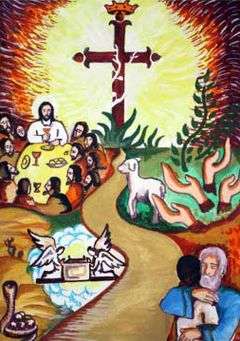Sawma Rabba
The season of Sawma Rabba begins 50 days before Easter on Peturta Sunday and comprises whole period of Great Lent and culminates on Resurrection Sunday. During these weeks the faithful reflect on and meditate over the public life of Jesus and especially on its culmination in his passion, death and burial. Word Peturta in Syriac means "looking back" or "reconciliation". It is a God-given time for turning to one's own life more deeply and to become convinced of the abundant blessings of the loving God – the creation, the providential caring, the human fall, the helplessness of man to save himself, the promise of salvation, the redemption through His Son Jesus and the Passion of the Christ. Faithful enter the weeks of Great Fast, celebrating the memory of all the Faithful Departed on the last Friday of Denha. According to the ecclesial and liturgical vision of this tradition, the weeks of Great Fast is also an occasion to keep up the memory of the beloved Departed through special prayers, renunciation, almsgiving, and so on and thus prepare oneself for a good death and resurrection in Jesus Christ. During the fast faithful of Syro Malabar Church do not use meat, fish egg many dairy products and most favorite food items and also avoid sexual contacts on all days including Sundays and Feast days. Before European colonisation Nasranis used to take only food on once in a day (after 3:00PM) on all days during Great Fast.
| Season of Great Fast | |
|---|---|
 Icon depicting the theme of Season of Great Fast | |
| Observed by | East Syriac Christians |
| Type | Christian, cultural |
| Significance | Commemoration of the 40 days fasting and Crucifixion of Jesus |
| Observances | Church services |
| Begins | 50 days before Resurrection Sunday |
| Frequency | Annual |
| Related to | Good Friday, Thursday of Pesha, Great Fast, Syro Malabar Church |
| Christian liturgical year |
|---|
| Western |
| Eastern |
|
| East Syriac Rite |
|
Feasts in Lenten Season
- Peturta Sunday on First Sunday of Great Fast
- Ash Monday or Clean Monday on first day(Monday) of Great Fast
- Lazarus Friday on sixth Friday of Great Fast
- Oshana Sunday on Seventh Sunday of Great Fast
- Thursday of Pesha
- Friday of Passion or Good Friday
- Great Saturday or Saturday of light
Following feasts comes in the Lenten Season always
- Feast of Mar Cyril of Jerusalem (March 18)
- Feast of Saint Joseph (March 19)
- Feast of Annunciation (March 25)